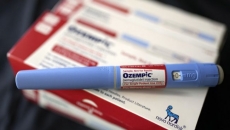Federal scientists will be monitoring global research to determine the effectiveness of updated vaccines against the latest COVID-19 variant, Health Canada and the Public Health Agency of Canada say.
Canada's first known case of the Omicron variant BA.2.86 was detected this week in British Columbia as the country became the seventh in the world to report its presence.
Health Canada is currently reviewing applications for Moderna and Pfizer-BioNTech's new mRNA vaccines, developed against the dominant XBB.1.5 variant ahead of a vaccination campaign set for the fall.
As of this week, there were only 13 sequences of the highly mutated variant BA. 2.86 available to analyze across six other countries — four in Denmark, three in the United States, two in Portugal, two in South Africa, one in Israel, and one in the United Kingdom, Health Canada and PHAC said in an email.
"Scientists are looking for signs that BA.2.86 lineages would change disease severity or spread, or impact the effectiveness of diagnostic tests, vaccines or treatments for COVID-19," they said.
"As this new variant was just detected in Canada, it is difficult to have an understanding of its prevalence. As laboratories' and clinical data is reported to PHAC, a more accurate picture will begin to emerge."
COVID-19 cases involving the XBB.1.5 variant are currently at a low to moderate level, with stable or increasing trends in all reporting provinces and territories, Health Canada and PHAC said.
However, a hospital in Windsor, Ont., and another in Montague, P.E.I., announced outbreaks of the illness this week.
The BA.2.86 variant was detected in a B.C. resident who had not recently been outside the country, provincial authorities said this week.
Provincial health officer Dr. Bonnie Henry and Health Minister Adrian Dix said in a joint statement that there doesn't seem to be increased illness severity with the strain and the infected person was not in hospital.
Federal figures show that, as of mid-June, 80.5 per cent of Canadians had received their primary series of COVID vaccines. The highest uptake, at nearly 92 per cent, was in Newfoundland and Labrador. The lowest, at 75.5 per cent, was in the Northwest Territories, followed by Alberta, where 76 per cent of people were vaccinated.
Dawn Bowdish, an immunologist at McMaster University in Hamilton, said it's understandable that people are tired of COVID-19 amid a mostly normal return to social activities, but the mutating virus puts vulnerable populations, including the elderly, most at risk of infection.
However, only about 21 per cent of Canadians aged 80 and over have received boosters or completed a primary vaccination series in the last six months, she said.
The National Advisory Committee on Immunization (NACI) has recommended Canadians roll up their sleeves for a booster in the fall if it has been at least six months since their last dose or COVID-19 infection.
Bowdish said anyone starting chemotherapy or having major surgery may consider getting a booster before the reformulated vaccines are available but it's otherwise best to wait.
Parts of the Southern Hemisphere have faced a triple threat during its respiratory season, which usually starts in April and ends in September in that region.
"They had a lot of influenza, they had a lot of RSV. They had a lot of COVID and they reported a lot of health-care worker absences, which means care for all things is impaired," she said of Australia's recent experience.
However, Australians had access to the current bivalent COVID vaccines, not the reformulated ones.
"What I worry about is it doesn't need to be any worse or as bad as last year to still majorly impact health care for Canadians," Bowdish said of a respiratory season that saw shortages of children's pain relievers and long waits in emergency rooms.
Bowdish is hoping Canadians won't hesitate to get a booster this fall, when they could be vaccinated against influenza at the same time.
For people over 60, a vaccine for RSV, or respiratory syncytial virus, may also be available. Earlier this month, Health Canada announced the approval of a vaccine for RSV for those aged 60 and up, but it's up to the provinces and territories to decide if and when Arexvy will be included in their vaccination programs.
Eric Arts, a virologist at Western University in London, Ont., noted many Canadians are getting to the one-year mark since their last booster so it will be important to get vaccinated in the fall.
The updated vaccines' formula will be a minor change from current vaccines but with better protection against circulating Omicron variants, he said.
"Hopefully, the bureaucracy will be fast to get them out."






